Japanese corporate culture sets strict standards for grooming and workwear, reflecting deeply ingrained values of respect and professionalism. Navigating these expectations is crucial for anyone entering the workforce in Japan.
In this article, we address all you need to know about Japanese business attire including how to dress to Japanese office standards, where to buy suits in Japan, and the gradual changes to office dress codes.
First Published: 2020-09-11
Updated: 2024-5-28
Table of Contents
- The Importance of Japanese Business Attire
- Japanese Business Attire and Grooming Standards
- Where to Buy Japanese Business Attire in Japan
- Recent Changes to Japanese Office Dress Codes
- Find Jobs in Japan with WeXpats
 Are you having any issues with job-hunting in Japan?
Are you having any issues with job-hunting in Japan?
The Importance of Japanese Business Attire

Dress codes and appearance are very important when it comes to Japanese work culture and business etiquette. Japanese business attire consists of a business suit for both men and women, there are also grooming standards to appear professional and presentable. But Japanese business attire is not just about looks; it is also a sign of respect and tradition.
Respect and Tradition
At the heart of Japanese business attire is the concept of respect. Respect isn’t just shown through words or actions, it is also conveyed through appearance. The appropriate formal dress for business settings in Japan is a business suit for both men and women. It is an indication of respect to the other party and to company culture.
An Extension of Uniformity
Japanese business attire can be said to be the uniform of businessmen, businesswomen and office workers. At its core, Japanese society values harmony and group cohesion, principles that are deeply ingrained in Japanese culture, and one aspect of that is uniforms. This is not just reflected in workwear but Japanese schools where designated uniforms are mandatory.
For that reason, there is a standard look for Japanese business attire consisting of dark coloured suits, white inner shirts, and tie (for men). This is the classic image of a Japanese salaryman. Not only does it look professional and neat, but the uniformity means that nobody stands out too much. Going against tradition will make you stand out and not in a good way - after all “the nail that sticks out gets hammered down”.
However, as we will address further below, times are changing and Japanese corporations have become more flexible with how standard Japanese business attire and officewear in general may look.
Writer's Pick
Japanese Business Attire and Grooming Standards

Below, we will introduce into more detail about business attire and grooming standards for men and women, separated by gender for ease of reference..
Are black suits acceptable as Japanese business attire?
In Japan, opinions are divided on whether black suits, which are usually worn for funeral wear and especially serious occasions, are appropriate as business attire. Some people think it is acceptable, while others find it too formal. The exception however are interview suits, called “Recruit Suits (リクルートスーツ, Rikuru-to Su-tsu)”, worn by students when job hunting in Japan.

[Men] Japanese Business Attire and Grooming Standards
Navy or dark grey suit, inner white shirt, and tie is the standard business attire for men. Ties may be in plain colours or simple patterned. Avoid wearing plain black ties which are worn to funerals. As for shoes, polished leather shoes in black or dark brown are acceptable.
Men’s hair should be neatly trimmed and styled in a professional manner. If you choose to sport facial hair, keep it well-groomed and neatly trimmed, or else maintain a clean-shaven look. Cologne or after-shave should be lightly scented or fragrance free.
[Women] Japanese Business Attire and Grooming Standards
Women have more flexibility when it comes to business attire, but at the same time more rules when it comes to grooming standards.
For attire, the most formal look is a full suit (pants or skirt) in navy or dark grey, white inner shirt, stockings and modest heels. In lieu of a white shirt, plain light-coloured simple blouses are also acceptable. Skirts should be knee-length and not tight to maintain modesty, and skin-coloured stockings should be worn together. As for shoes, simple close-toed heels, loafers, flats in black or dark brown are acceptable.
Women’s hair should be neatly styled and maintained, and not in bright colours. Makeup should be subtle and natural for a professional look. Nails should be clean, well-groomed, and at a moderate length. If you want to get your nails done, choose simple light colours and designs that don’t stand out too much. Perfume should be used sparingly with subtle scents.
Where to Buy Japanese Business Attire in Japan
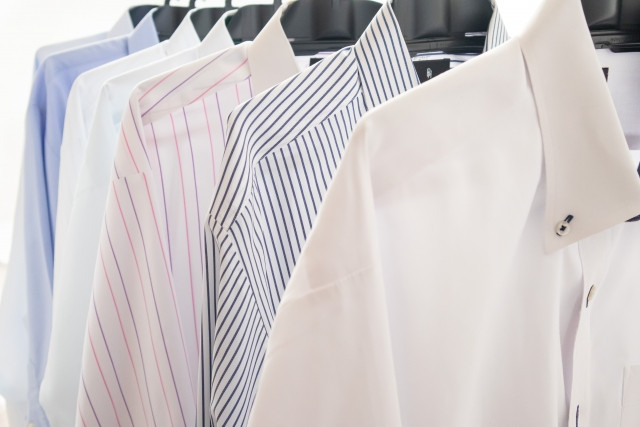
In Japan, there are several options for purchasing Japanese business attire, as well as a wide price range. Places you can buy suits in Japan include department stores, suit specialty-stores, business wear specialty stores, and even some supermarkets.
Below are our recommendations for the best places to buy suits in Japan.
Uniqlo
Japanese clothing brand Uniqlo, which is known for its high-quality yet affordable clothing, offers a range of suits suitable for business attire. Uniqlo’s clothing are affordable, durable and versatile making them a popular choice in Japan and around the world. A suit set consisting of a jacket and bottoms costs from 10,980 Yen at Uniqlo. We also recommend getting Uniqlo’s super non-iron shirts.
Orihica, Aoyama Tailor (洋服の青山), Perfect Suit Factory
These three brands specialise in suits, business wear and business casual wear. They are highly recommended for their good quality, comfort, functionality, and design. All three brands have a similar price range with suits costing from around 20,000 Yen. The wide price range is because of the various options for fabric, with better quality and design fabrics costing more.
In addition, they offer tailor-made suits, called オーダースーツ (O-da Su-tsu) in Japanese, where customers can have suits made-to-measure, select suit design and cutting, select fabric type and pattern, and even select stitching and buttons. Tailor-made suits are more expensive than ready-to-purchase suits.
All three stores have online shopping services for convenient shopping. Some suits designs are online limited only, so make sure to check them out.
Fabric Tokyo, Kashiyama, Only
These four brands specialise in suits and business wear with a price range from 30,000 Yen for a suit set. These brands are also considered pretty affordable considering their excellent design and comfort and high quality.
They offer a selection of professional business attire as well as fancier cut suits and vest sets. A vest would be too much to be considered as regular office wear and business attire, but can be considered for those holding higher corporate positions, as well as for special occasions.
Other brands for buying suits in Japan include:
- Global Style
- AOKI (青木)
- Suit Ya
For even cheaper suits that can cost less than 10,000 Yen (!), visit supermarkets that have fashion sections. For example, Aeon Retail, Seiyu and Ito-Yokado.
Recent Changes to Japanese Office Dress Codes
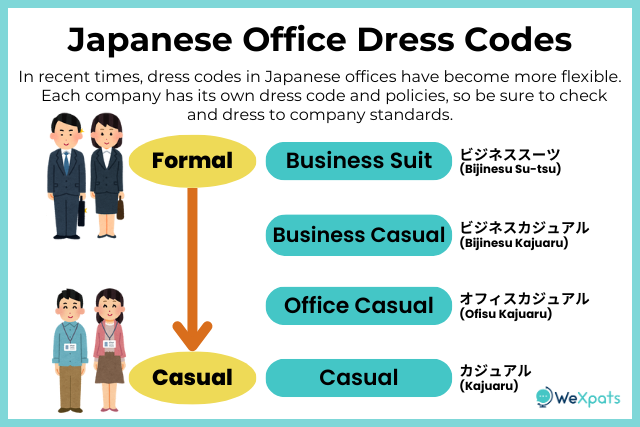
Before working in Japan, it may seem that stuffy business suits are the only option for office wear, but this actually depends greatly on each company’s culture as well as the position you hold in the company. In recent times, there are many Japanese companies that allow business casual wear for all employees, and even casual wear for employees whose positions do not require meeting clients.
Salesman and Saleswoman in Japan
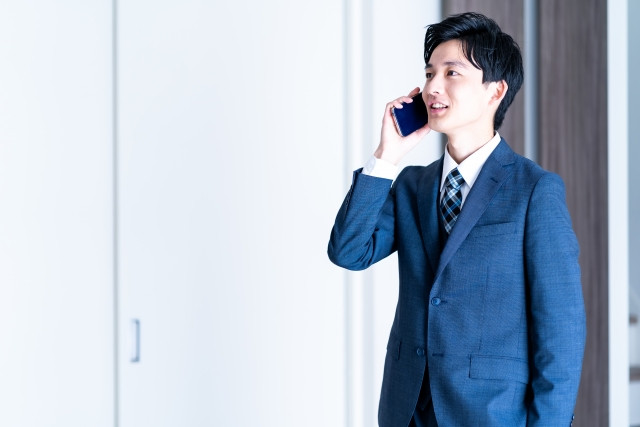
Salesmen and saleswomen in Japanese corporations whose duties involve meeting customers and clients are the face of the company. Therefore, Japanese business attire is the uniform they wear, with navy suits being a popular choice. Depending on the company’s rules, salesmen and saleswomen may wear business casual or casual wear on days when there are no client meetings.
Non-Sales or Client / Customer Interaction Positions

There is a growing number of companies in Japan that allow business casual or even casual wear in the office for personnel whose duties do not require meeting people outside the office, though dressing formally for important internal company meetings may be necessary. Even if the dress code for the office is casual, you are still expected to be neat and decently dressed. If you are unsure what is appropriate to wear, you may ask HR or observe your other colleagues.
“Cool Biz” Campaign, Dress Code for Summer
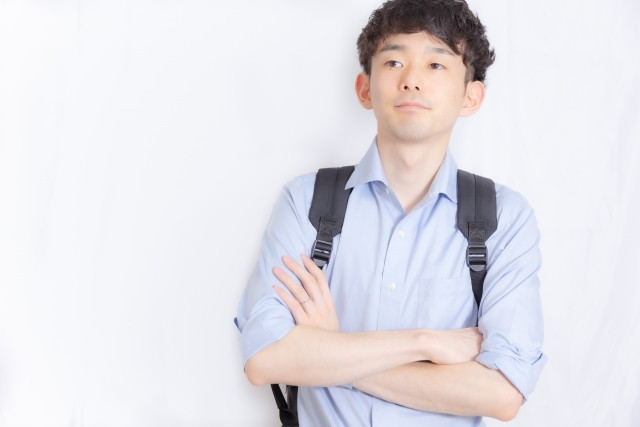
“Cool Biz” is short for “cool business”. The Cool Biz campaign was launched in summer 2005 by the Japanese Ministry of Environment to promote energy conservation and reduce carbon emissions by encouraging businesses to adopt more relaxed dress codes and limit air conditioning temperatures during summer months.
As part of the campaign, the Japanese government standardised air conditioner temperatures to 28°C (82°F) in government buildings through summer. Relaxed government staff dress codes included wearing summer clothing, such as short-sleeved shirts, no jackets or ties, and breathable material pants and skirts.
Since its inception, Cool Biz has gained widespread recognition in Japan. Though there are still many companies that choose to use low temperatures for air conditioning, the summer wear dress code has been adopted by many companies.
In 2011, the “Super Cool Biz” campaign was launched to further promote energy conservation. More drastic changes to summer wear included the addition of polo shirts, T-shirts, Hawaiian shirts, chino pants, jeans, sneakers, sandals, etc. to be allowed. Make sure to check your company’s policy on summer wear before proceeding - some companies allow sleeveless blouses and dresses while others do not. Modesty must still be maintained, and overly transparent clothing is not allowed.
Find a Job in Japan with WeXpats
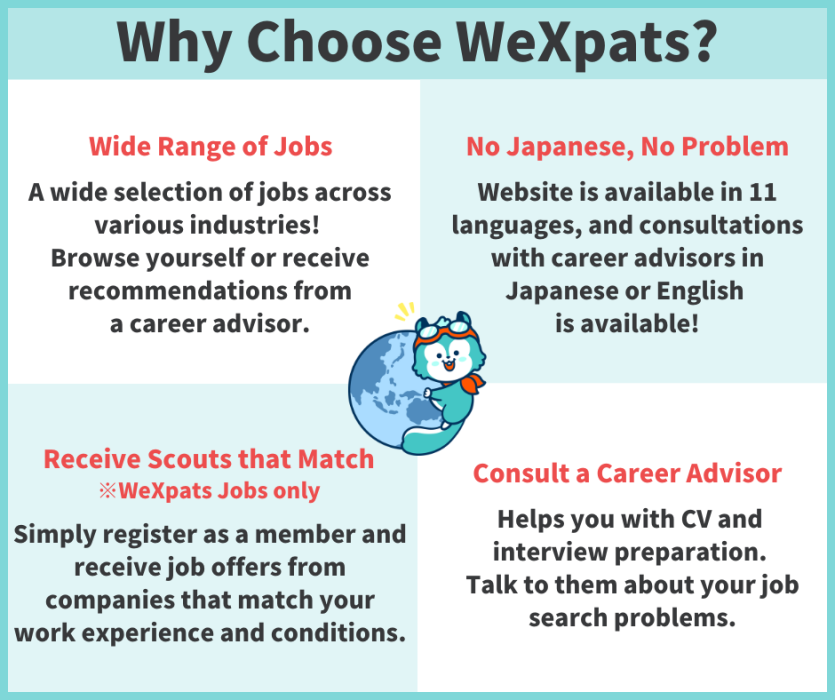
WeXpats operates a service for foreign nationals who want to work in Japan. There are jobs in a variety of industries. There are 2 services available on WeXpats - WeXpats Agent for full time jobs and WeXpats Jobs for part time jobs.
Looking for a Full Time Position? Leave it to WeXpats Agent!
WeXpats Agent is a career support service that specialises in employment for foreign nationals living in Japan.
Recruitment agencies in Japan are a service where dedicated career advisors will assist you with your job hunt for free. In addition to introducing open positions, we also provide support to help you create your Japanese resume and practice for interviews. Worried about job hunting in Japanese? We are here for you.
Features of WeXpats Agent
-
We have many job openings that are a good fit for foreign nationals to work in, such as translation, interpretation, inbound, etc. jobs that make use of your language skills, as well as engineering etc. jobs that do not require Japanese skills.
-
Our career advisors support and help you prepare your resume and practice job interviews with you. Clearly communicate your strengths to the hiring company.
-
We will handle communication with companies on your behalf, such as arranging interview dates and negotiating conditions. And thereby reducing your stress and time spent.
Finding a Part Time Job? Browse on WeXpats Jobs!

WeXpats Jobs is a part time job site for foreign nationals living in Japan. You can search for jobs in 11 languages (English, Vietnamese, Korean, Indonesian, Traditional Chinese, Simplified Chinese, Burmese, Thai, Spanish, Portuguese), including Japanese. Find jobs that suit you by specifying your Japanese language level, occupation, location, and etc.
※ You can register from outside Japan, but only those living in Japan can apply for jobs.




































